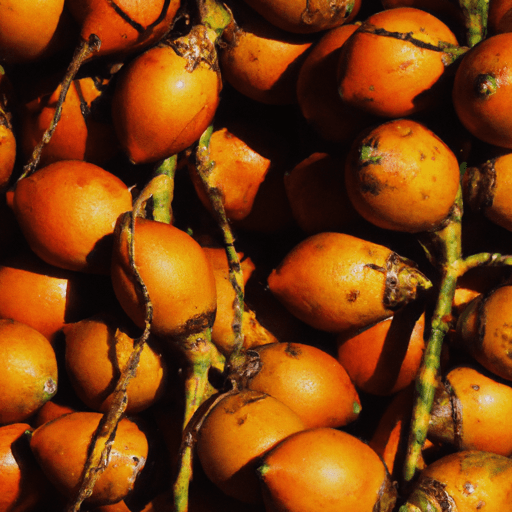The Wonderful World of Arecanut: A Culinary Treasure
Are you an adventurous foodie always on the lookout for exciting new ingredients? If so, let me introduce you to the arecanut, also known as betel nut, the jewel of Indian cuisine. With its unique taste, versatile applications, and plethora of health benefits, this exotic nut is truly a culinary treasure!
A Taste Sensation Like No Other
Arecanuts have an intriguing flavor that is difficult to compare to anything else. They possess a mildly astringent and slightly bitter taste, which can be an acquired delight for those with an adventurous palate. When consumed fresh, the nut delivers a refreshing and slightly spicy kick, leaving a slightly sweet aftertaste that lingers on the tongue.
From Savory to Sweet: Versatility at Its Finest
Arecanuts are widely used in various culinary traditions, adding a distinctive and tantalizing flavor to both savory and sweet dishes. In Indian cuisine, they are often incorporated into mouth-watering chutneys and pickles, lending a unique tanginess and crunch. In South Indian cuisine, arecanuts are often consumed as a digestive after meals, commonly paired with betel leaves and a mix of spices known as pan masala.
The nut also shines in sweet treats, finding its way into traditional Indian desserts. It can be grated, roasted, or made into a paste, becoming an integral part of mouthwatering sweets like paan masala, betel nut ladoo, and betel nut halwa. The combinations are endless, showcasing the versatility of this modest nut in both culinary and cultural contexts.
A Nutritional Powerhouse
Beyond its culinary merits, arecanuts pack a nutritional punch. They are rich in essential nutrients, including protein, dietary fiber, calcium, iron, phosphorus, and various B vitamins. Arecanuts also provide a natural source of antioxidants, which help combat harmful free radicals in the body.
However, it’s important to note that arecanuts are known to contain tannins and are sometimes associated with certain health concerns. As with any food, moderation is key, and it is best to consult a healthcare professional before adding arecanuts to your regular diet.
A Journey through History and Culture
The history of arecanuts traces back thousands of years. Native to tropical Southeast Asia, this nut holds great cultural significance in many Asian countries, particularly India and Indonesia. In these regions, chewing betel nuts has been a social custom and an integral part of religious and ceremonial practices for centuries.
In ancient times, arecanuts were offered as a symbol of hospitality and respect. They were often used as a mild stimulant, as their consumption is believed to help freshen breath, aid digestion, and provide a gentle energy boost. Today, arecanuts continue to be an important cultural element in ceremonies and social gatherings throughout Asia.
Fun Facts about Arecanuts
- Arecanuts belong to the same family as the palm tree and coconut.
- The arecanut tree can reach heights of up to 30 meters, making it an impressive sight in tropical landscapes.
- Arecanuts have been used for their medicinal properties in traditional Ayurvedic and Chinese medicine systems for centuries.
Discover the Arecanut Adventure
If you’re an adventurous cook or a curious food lover, it’s time to embark on an arecanut adventure. Experiment with traditional Indian recipes, tantalize your taste buds with new flavors, and appreciate the cultural significance of this remarkable nut. Whether you’re preparing a spicy chutney or a delightful dessert, the arecanut’s unique taste and versatility will keep you coming back for more.
So next time you’re strolling through the aisles of your local market or spice bazaar, keep an eye out for the humble arecanut – a true gem waiting to be discovered in the world of cooking.
Note: The information provided in this article is intended for general purposes only and should not be considered medical advice. Please consult with a healthcare professional before making any dietary changes or incorporating new food items into your routine.
Interesting Facts about Areca Nut:
- Origin: The areca nut, also known as betel nut, is the seed of the betel palm (Areca catechu). It is native to the tropical regions of Southeast Asia, particularly Malaysia and Papua New Guinea.
- Common Uses: Areca nuts are often consumed in various forms, mainly in combination with betel leaves and other ingredients to create a popular chewable mixture called “paan” or “betel quid.” The paan may contain areca nut slices wrapped in a betel leaf along with other additives like spices, tobacco, and sweeteners. Areca nut is also used in traditional medicine and as a natural dye.
- Nutritional Benefits: Areca nut contains a range of nutrients, including carbohydrates, proteins, healthy fats, minerals like calcium, potassium, and iron, and vitamins such as thiamine and niacin. However, it is worth noting that the consumption of areca nut comes with potential health risks due to the presence of alkaloids like arecoline and tannins.
- Unique Properties: The areca nut contains alkaloids, with arecoline being the most notable one. This alkaloid has stimulant properties similar to nicotine, which contributes to its mildly addictive nature. The nut’s red husk also contains tannins which give it an astringent taste.
- Historical Significance: The use of areca nut dates back centuries and holds cultural, religious, and traditional significance in many communities. Its consumption is deeply rooted in various rituals, social gatherings, and celebrations across parts of Asia. Despite its historical significance, the health risks associated with consuming areca nut have led to increasing regulations and concerns regarding its consumption in recent years.
Please note that while areca nut has cultural and historical significance, its consumption has been linked to various health risks, including an increased risk of oral cancer, cardiovascular issues, and addiction. It is always best to consult with healthcare professionals about potential health concerns.




Use the share button below if you liked it.
It makes me smile, when I see it.